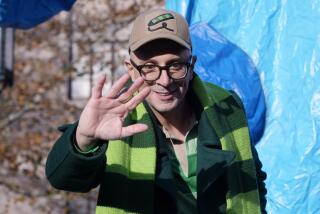Mourners Say Goodbye to a Comedy Legend
- Share via
They went to pay tribute to the raspy-voiced comedian who made cigars and one-liners his trademark.
They reminisced about the passing of a show business legend, a bespectacled funnyman who rode his schtick from vaudeville to Hollywood.
But even as they mourned, the humor of George Burns continued to play the crowd in perhaps the most fitting tribute of all.
“As the years advanced, I would discuss his possible retirement. He would say, ‘Retire? What am I supposed to do, stay home and play with my cuticles?’ ” Burns’ longtime friend and manager, Irving Fein, told about 60 friends and relatives who gathered at Forest Lawn cemetery in Glendale on Tuesday.
There were no celebrities at this funeral. It was a quiet, personal affair for those closest to Burns, who died of heart failure at age 100 on Saturday at his home in Beverly Hills.
Mourners filed quietly into the Wee Kirk o’ the Heather Chapel, a modest hideaway on a quiet hillside, for the half-hour service as a light rain began to fall outside.
Burns’ longtime pianist and conductor, Morty Jacobs, played a salute to his pal, a medley of old tunes that Burns had used in his stand-up act, songs that he loved, including “Sidewalks of New York,” “By the Light of the Silvery Moon” and “Love Nest.”
Although the service was modest, the remembrances of Burns were as grand as his life.
“George Burns will continue to live on . . . as a treasure across this world in every heart that he brought laughter and joy to,” Rabbi Harvey Fields of Wilshire Boulevard Temple told the audience. “He will continue to live on for the acts of goodness and generosity he performed, but most of all, in his own inimitable enthusiasm for life.”
Friends spoke of Burns’ sheer determination to succeed in show business, a quality that helped propel his career through nine decades.
Born Nathan Birnbaum on the Lower East Side of Manhattan in 1896, Burns began in vaudeville as a teenager before teaming up with Gracie Allen, his wife and the other half of a duo that charmed radio and television audiences for nearly three decades on “The George Burns and Gracie Allen Show.” She retired in 1958.
In that famous comedy team, Burns played the straight man, while Allen obligingly turned the jokes as his scatterbrained partner.
They would end each show with the same routine. “Say good night, Gracie,” Burns would say. “Good night, Gracie,” Allen would respond.
Allen died in 1964, and Burns eventually stepped out with his own solo act, playing nightclubs in Las Vegas, appearing in television specials and winning an Academy Award for his supporting role in the film “The Sunshine Boys,” in which he played a retired vaudeville performer.
Burns had planned to play the Palladium in London for his 100th birthday but was too ill to make the appearance. In the end, he had appeared in more than a dozen movies and had written 10 books.
“One of the many things I admired about George was his absolute determination to keep doing what he loved best in the world--working in show business,” Fein said at the funeral service.
“Singer, dancer, straight man, actor, comedian, author. He will leave a very large void in our lives.”
But Burns was remembered perhaps most fondly for his razor wit, those one-line zingers that could send a room into fits of laughter.
“People would say, ‘Oh, Mr. Burns, it’s so nice to see you,’ ” Barry Mirkin, a longtime friend, recalled after the funeral service. “And he would say, ‘At my age, it’s good to see anybody.’ ”
Mirkin lunched with Burns virtually every day for the last 40 years at the Hillcrest Country Club. There Burns held court over the Comedians’ Round Table, which featured such talents as Groucho Marx, Al Jolson, Milton Berle, Danny Kaye and Danny Thomas--each matching wits with the other, joke for joke.
Mirkin recalled how the country club prohibited smoking in its dining area but made an exception for Burns, who seldom had been seen in public without an El Producto in his mouth. For much of his adult life, he smoked 15 to 20 cigars a day.
About two years ago, the club put up a plaque behind Burns’ seat at the table where he played bridge, stating the new policy: Anyone over 90 could smoke.
“It worked out very well,” recalled Mirkin, 75. “If anyone questioned why he was smoking, we just pointed to the plaque.”
But Mirkin, 75, said he also will miss Burns for his gentle manner and sensitive qualities. Burns frequently tipped bellboys for even the most basic services. And he visited Allen’s grave at Forest Lawn every month to speak with his wife about his career and everyday events.
Burns will be entombed next to Allen in a mausoleum at the cemetery.
He is survived by his son, Ronald J. Burns; his daughter, Sandra Jean Burns; seven grandchildren and five great-grandchildren.
Mirkin said he is planning another memorial for Burns in the coming weeks that is expected to attract many of the celebrities that Burns counted as friends, including Berle, Buddy Hackett, Billy Crystal, Bob Newhart and others.
But perhaps the most personal, and most poignant, sentiments came at the small chapel on the hillside.
“He often said he knew entrances and exits,” Fein recalled at the funeral. “And last Saturday, he knew it was time to go.
“George, we’ll miss you,” Fein said. “I know you took your music with you. So wherever you are, I hope they’re playing it in your key.”
More to Read
The biggest entertainment stories
Get our big stories about Hollywood, film, television, music, arts, culture and more right in your inbox as soon as they publish.
You may occasionally receive promotional content from the Los Angeles Times.










